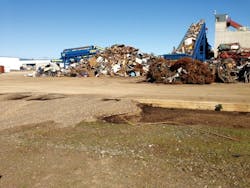About the author: Jon Wilson, CSM, is storm water regulatory compliance coordinator for the city of Eugene, Ore. Wilson can be reached at [email protected] or 541.682.8616.
Municipalities have long been delegated the authority to enforce regulations handed down by the state or federal government. An example of this would be a municipal planning and development department that issues building permits and ensures compliance with electrical, plumbing and fire codes. This regulatory framework has worked well in the past because it enables the local government to work closely with its business community and collaboratively develop a manner in which to comply with regulatory requirements without creating an unnecessary burden for the businesses.
Navigating Industrial Permits
Under a similar regulatory framework, NPDES permits are issued to municipalities for storm water discharges to surface waters and require local governments to address discharges from industrial sites, even though these sites often are subject to a separate set of NPDES permit requirements themselves. By administering the industrial storm water discharge permits on behalf of the state, municipalities are able to fulfill their NPDES requirements while helping businesses to comply with their own NPDES permit requirements, all while strengthening their relationships with both the local business community and the state’s water quality program.
With few exceptions, if a business creates a tangible product and exposes any materials to storm water, which then is discharged to surface waters, it is required to obtain permit coverage. This permit requires the business to identify measures that will be taken to minimize the pollutant concentration in its storm water discharge, conduct monitoring to determine how effective these measures are, modify site practices to further minimize exposures if monitoring results indicate that such measures are needed, and establish spill response procedures.
Partnerships in Oregon
In 1998, the Oregon Department of Environmental Quality (DEQ) approached the Oregon Association of Clean Water Agencies and began discussions regarding the potential for municipalities to administer the NPDES General Industrial Stormwater Discharge Permit Program on its behalf. As a result, the DEQ offered to partner with municipalities to implement certain parts of the program in exchange for fee sharing. A memorandum of agreement (MOA) was developed, outlining the responsibilities of each party, dispute resolution procedures, and procedures for amending and terminating the MOA. The city of Eugene, Ore., entered into such an agreement with the DEQ in 2000.
In short, the DEQ retained the responsibility for issuing the industrial storm water discharge permits, collecting annual permit fees and issuing all formal enforcement actions for permit violations. The city of Eugene provides technical assistance to permitted businesses; identifies businesses that need permits and assists them through the permit application process; reviews monitoring data, storm water pollution control plans and corrective action reports; conducts site inspections; solicits voluntary compliance; and forwards businesses for formal enforcement in instances of non-compliance if voluntary compliance is not achieved. For clarity, soliciting voluntary compliance involves formally documenting permit violations by issuing warning letters sent via certified mail, and formal enforcement essentially is limited to the issuance of civil penalties.
Although the city is required to inform businesses that they are subject to additional regulations and involved in formal enforcement proceedings, the agreement enables the city to overshadow this negative perception by assisting the businesses with other aspects of the permit. The MOA requires the city to provide technical assistance, and this responsibility is seen as the fundamental goal of the industrial storm water program. Businesses often do not consciously choose to be out of compliance with environmental regulations, but instead are unaware of what is required or do not have a system in place that incorporates the required activities into the company’s day-to-day operations. Working closely with other businesses on these issues enables the city to provide more effective outreach and suggest strategies that have been effective in other situations.
Working directly with business representatives by providing technical assistance demonstrates that the municipality has a genuine interest in ensuring that the business is in compliance with its permit, thereby avoiding costly civil penalties and third-party lawsuits. Establishing a relationship with an individual within the municipal organization helps businesses build a trusting relationship with the municipality. Having a trusted point of contact is beneficial, as a business can contact someone it is familiar with should concerns that are not necessarily related to storm water arise. In the event the municipal employee is unable to address the issue at hand, he or she most likely can identify the appropriate person or workgroup within the organization that is able to provide assistance. This arrangement provides an opportunity for the municipality to provide a high level of customer service.
Mutual Benefits
Municipal storm water programs benefit from this relationship because they are able to develop an in depth knowledge of the materials and processes at the industrial sites within their jurisdictions, and are required to be notified in the event an industrial process changes. This information can be utilized when analyzing a municipality’s storm and surface water data. This knowledge is important when identifying the type of storm water retrofit treatment mechanism that could be utilized in a particular area. For example, it would not be advisable to build a bioswale directly downstream from a business that stores a significant quantity of hazardous chemicals due to the potential for a spill to result in both surface water and groundwater contamination.
Municipalities have a tendency to see the state in a purely regulatory role, which makes sense, as municipal wastewater treatment plant and MS4 permits are issued by the state and these entities generally only speak to each other around the annual report submittal and permit renewal periods. Administering NPDES permits on behalf of the state breaks down the regulator/regulated relationship, and both agencies are able to see each other as partners in the shared goal of protecting water resources while strengthening relationships and continuing to build public trust.
Download: Here


